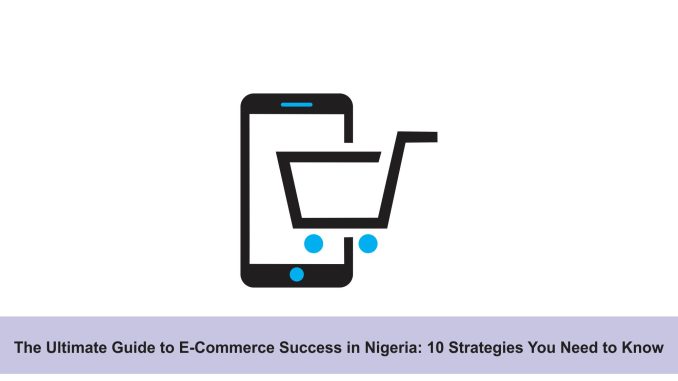
E-commerce in Nigeria has seen explosive growth over the last few years. With increasing internet penetration, a young and tech-savvy population, and evolving online payment solutions, the e-commerce sector is thriving. However, succeeding in this rapidly growing industry requires more than just setting up an online store. To help you stay ahead of the competition and build a thriving e-commerce business, we’ve compiled 10 essential strategies for e-commerce success in Nigeria.
1. Choose the Right Niche for Your E-Commerce Business

Choosing the right niche is the first step toward e-commerce success. While the Nigerian market offers a broad range of opportunities, picking a niche that aligns with your passion, expertise, and market demand is key. Some of the popular e-commerce niches in Nigeria include fashion, electronics, beauty, health, and groceries. However, emerging sectors like digital products, online education, and home services are gaining traction.
Tip: Conduct thorough market research to understand your target audience and identify gaps in the market where your business can thrive. Tools like Google Trends and social media insights can help identify niche opportunities.
2. Create a User-Friendly Website
Your website is the face of your e-commerce business. A professional, easy-to-navigate, and mobile-friendly website can make or break your success in the competitive Nigerian market. Remember, more than 80% of Nigeria’s internet users access websites via mobile phones, so optimizing your site for mobile is critical.
Key Features of a User-Friendly E-Commerce Website:
- Fast loading speed
- Simple, intuitive navigation
- Secure payment gateways
- Clear product descriptions and high-quality images
- Seamless checkout process
Pro Tip: Leverage tools like Shopify, WooCommerce, or Magento for user-friendly website building and customization options.
3. Leverage Social Media Marketing
Social media platforms are goldmines for driving traffic and increasing brand visibility. Nigerians spend a significant amount of time on social media platforms like Instagram, Facebook, and Twitter. Using these platforms effectively can help you connect with potential customers and boost your e-commerce sales.
Social Media Marketing Tips:
- Run targeted ads to reach your ideal customer
- Collaborate with influencers who resonate with your target audience
- Post high-quality images, videos, and user-generated content
- Engage with followers by responding to comments and messages
Pro Tip: Instagram is particularly powerful for businesses in the fashion and lifestyle sectors. Showcase your products with high-quality visuals, and use relevant hashtags to reach a broader audience.
4. Provide Excellent Customer Service
Providing outstanding customer service can set your business apart from competitors and help you build a loyal customer base. In Nigeria, where trust in online transactions can be an issue, offering reliable and transparent customer support will go a long way in securing repeat customers.
Customer Service Best Practices:
- Offer multiple communication channels (e.g., live chat, WhatsApp, phone support)
- Respond promptly to queries and complaints
- Clearly state your return and refund policies
- Follow up with customers after a purchase to ensure satisfaction
Pro Tip: Offering a 24/7 support line via WhatsApp can be highly effective in Nigeria, where many customers rely on quick, direct communication for inquiries.
5. Optimize Your Online Payment Process
In Nigeria, secure and efficient online payment methods are critical for e-commerce success. The rise of fintech solutions such as Flutterwave, Paystack, and Quickteller has made it easier to accept payments online. However, customers still expect a smooth and secure payment process.
Tips for Optimizing Payments:
- Offer multiple payment options, including cards, bank transfers, and mobile wallets
- Ensure your website uses SSL encryption to protect customer data
- Clearly communicate transaction fees (if any) to avoid surprises during checkout
Pro Tip: Offer cash-on-delivery (COD) in areas where customers are still hesitant to pay online. This method can boost customer confidence and lead to increased sales.
6. Implement a Strong SEO Strategy
Search engine optimization (SEO) is crucial for increasing your website’s visibility in search results and driving organic traffic. By optimizing your site for search engines, you increase the likelihood of potential customers finding your business when they search for products or services you offer.
SEO Tips for E-Commerce:
- Use keyword-rich product descriptions and meta tags
- Create valuable blog content around relevant topics in your niche
- Ensure your website loads quickly and is mobile-friendly
- Secure backlinks from reputable websites to boost your domain authority
Pro Tip: Regularly update your website content to keep it fresh and relevant for search engines. A blog with tips, reviews, and industry insights can drive long-term organic traffic.
7. Offer Competitive Pricing and Discounts
In Nigeria’s price-sensitive market, competitive pricing is key to attracting customers. Offering value for money, along with occasional promotions and discounts, can significantly increase your customer base and improve sales.
Pricing Strategy Tips:
- Conduct a price analysis of your competitors to ensure your pricing is competitive
- Offer bundle deals or free shipping for purchases above a certain threshold
- Create time-limited offers and discounts to create urgency
Pro Tip: Use email marketing to notify subscribers of exclusive deals and discounts. This can encourage repeat purchases and customer loyalty.
8. Optimize Logistics and Delivery Services
Efficient logistics and timely delivery are critical components of a successful e-commerce business. Nigerian consumers place high importance on receiving their orders on time and in good condition.
Logistics Optimization Tips:
- Partner with reliable logistics companies like GIG Logistics, DHL, or Kwik Delivery
- Offer multiple delivery options, including standard, express, and same-day delivery
- Clearly communicate delivery timelines to customers during checkout
Pro Tip: Set up a reliable tracking system so customers can monitor the status of their orders. This transparency builds trust and reduces customer anxiety.
9. Leverage Email Marketing
Email marketing is one of the most cost-effective ways to nurture customer relationships and drive repeat sales. Regular email communication keeps your customers engaged and informs them about new products, promotions, and exclusive deals.
Email Marketing Tips:
- Create a strong lead magnet, such as a discount code or free guide, to build your email list
- Send personalized recommendations based on customers’ browsing or purchase history
- Use automated email sequences to welcome new subscribers and re-engage inactive customers
Pro Tip: Segment your email list to send targeted messages to different customer groups. This ensures higher open and conversion rates.
10. Track Performance and Continuously Improve
Finally, a successful e-commerce business requires constant monitoring and optimization. Use data to understand customer behavior, identify what’s working, and adjust your strategy accordingly.
Performance Tracking Tips:
- Use tools like Google Analytics to track website traffic, bounce rates, and conversion rates
- Monitor customer reviews and feedback to improve your products and services
- Analyze the effectiveness of marketing campaigns and adjust your strategies accordingly
Pro Tip: Regularly perform A/B testing on various elements of your website, such as product descriptions, images, or call-to-action buttons, to optimize for better conversions.
You May Also like: The Ultimate Guide to E-Commerce Success in Nigeria: 10 Strategies You Need to Know
Conclusion
Succeeding in Nigeria’s competitive e-commerce landscape requires strategic planning, constant innovation, and a customer-first mindset. By following these 10 proven strategies, you’ll be well on your way to building a successful e-commerce business in Nigeria. Whether you’re just starting or looking to scale, implementing these tips can help you stay ahead of the curve and thrive in the digital marketplace.
Have any questions about building a successful e-commerce business in Nigeria? Drop a comment below, and let’s discuss!

Be the first to comment